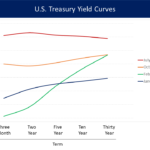The UK inflation rate rose by 2.6% in November from just 2.3% in October. This was due to higher fuel prices, increased grocery costs and an increase of tobacco duties.
The Core CPI (which excludes volatile food and energy prices) showed no change in the month of October. This pushed the rate to 3,5%, up from the 3.3% recorded last year, but slightly lower than the 3.6% expected.
The CPI rose from 1.7% in September, which was the lowest level since April 2021. However, it is still below the peak of 11% seen after the Ukraine War, 2022.
Data from the Office for National Statistics met the expectations of economists, and also highlighted the specific factors that drove the increase in inflation.
The Bank of England (BOE), which has a 2% inflation target, saw its second straight month of higher than expected inflation. This reinforces expectations that interest rates will remain unchanged at the final meeting of this year.
Consumer Prices Index, including Owner Occupants’ Housing Costs (CPIH), increased from 3.2% to 3.5% over the 12-month period ending November 2024.
|
CPI Item |
12-Month CPI Rate (%) |
|
|
Oct 20, 2024 |
Nov 2024 |
|
|
All Items |
2.3 | 2.6 |
|
Non-alcoholic drinks and food |
1.9 | 2.0 |
|
Alcohol |
5.3 | 6.9 |
|
Fashion and Footwear |
1.0 | 2.0 |
|
Household and housing services |
2.9 | 3.0 |
|
Household goods and furniture |
-0.5 | -0.4 |
|
Health |
5.6 | 5.5 |
|
Transport |
-1.9 | -0.9 |
|
Communication |
4.6 | 4.8 |
|
Culture and recreation |
3.0 | 3.6 |
|
Education |
5.0 | 5.0 |
|
Hotels and restaurants |
4.3 | 4.0 |
|
Other goods and Services |
2.9 | 3.0 |
|
All products |
-0.3 | 0.4 |
|
All Services |
5.0 | 5.0 |
|
Core CPI excluding food, energy and alcohol |
3.3 | 3.5 |
On November 1, the ONS reported that motor fuel prices and clothing costs increased while airline fares, which usually drop, saw their biggest decline in history.
The BOE had expected a 4.9% inflation rate for services, but it was 5%.
While inflation continued to be a concern, the value of the British pound was little altered at $1.27.
The CPI was expected to increase to 2.6%. While there were fears that the jump would be more dramatic, the drop in airfares has helped moderate inflation.
BOE to make decision Thursday
Increased inflation is a concern, as it can lead to “stagflation”, i.e. high inflation combined with slow growth.
Data on pay released Tuesday showed that wages grew faster than expected in the quarter ending October. This raises concerns about inflationary pressures.
Inflationary pressures are likely to remain high, especially in light of the recent tax increases on employers.
The Bank of England’s (BOE) upcoming Monetary Policy Committee on Thursday is expected to take a cautious stance towards interest rate reductions.
On Thursday, the BOE will likely keep its borrowing rates at 4.75% and then ease them gradually in 2019. Inflation risks both domestically and globally are still present.
The post UK inflation reaches eight-month high of 2.6% before BOE meeting may be updated as new information becomes available.
This site is for entertainment only. Click here to read more






